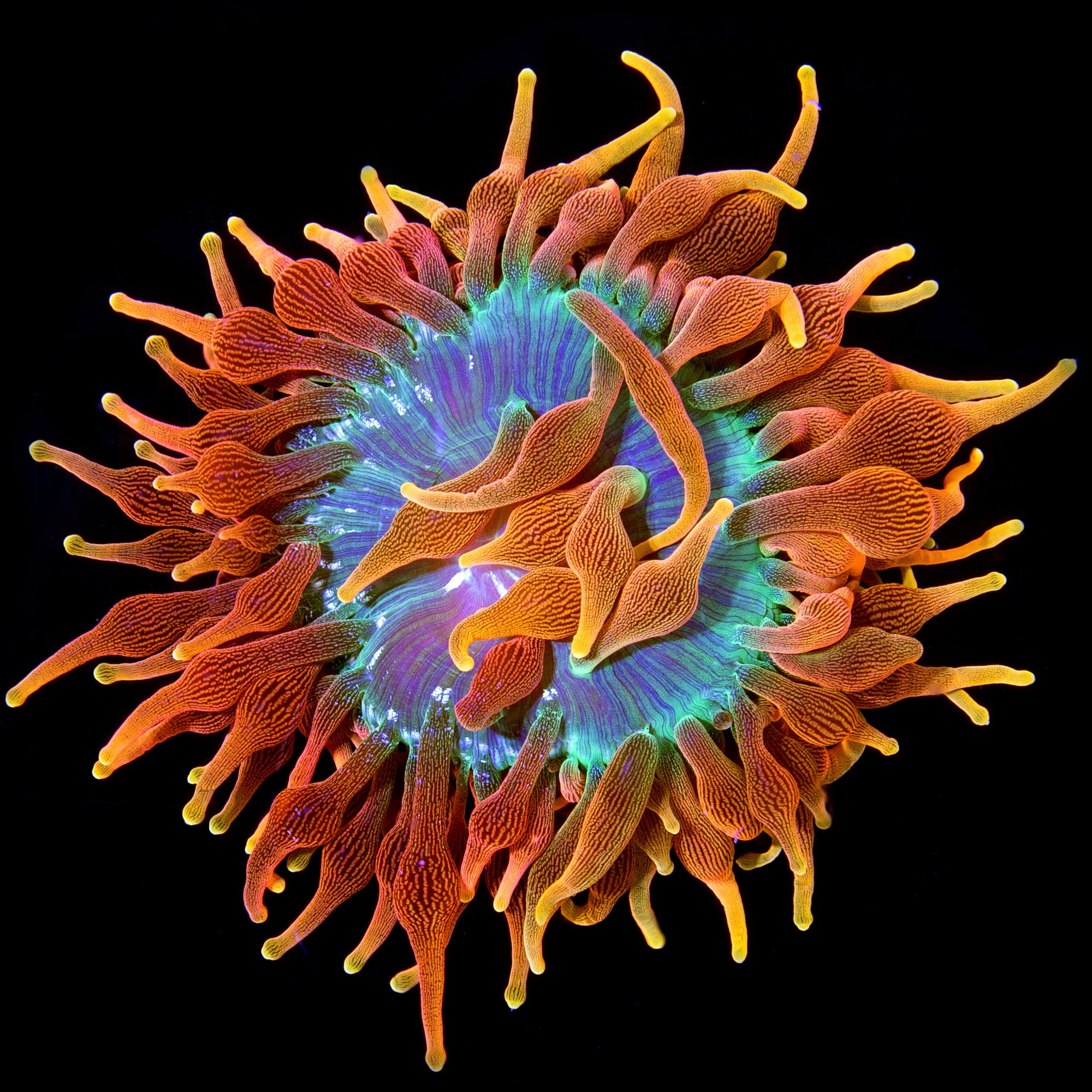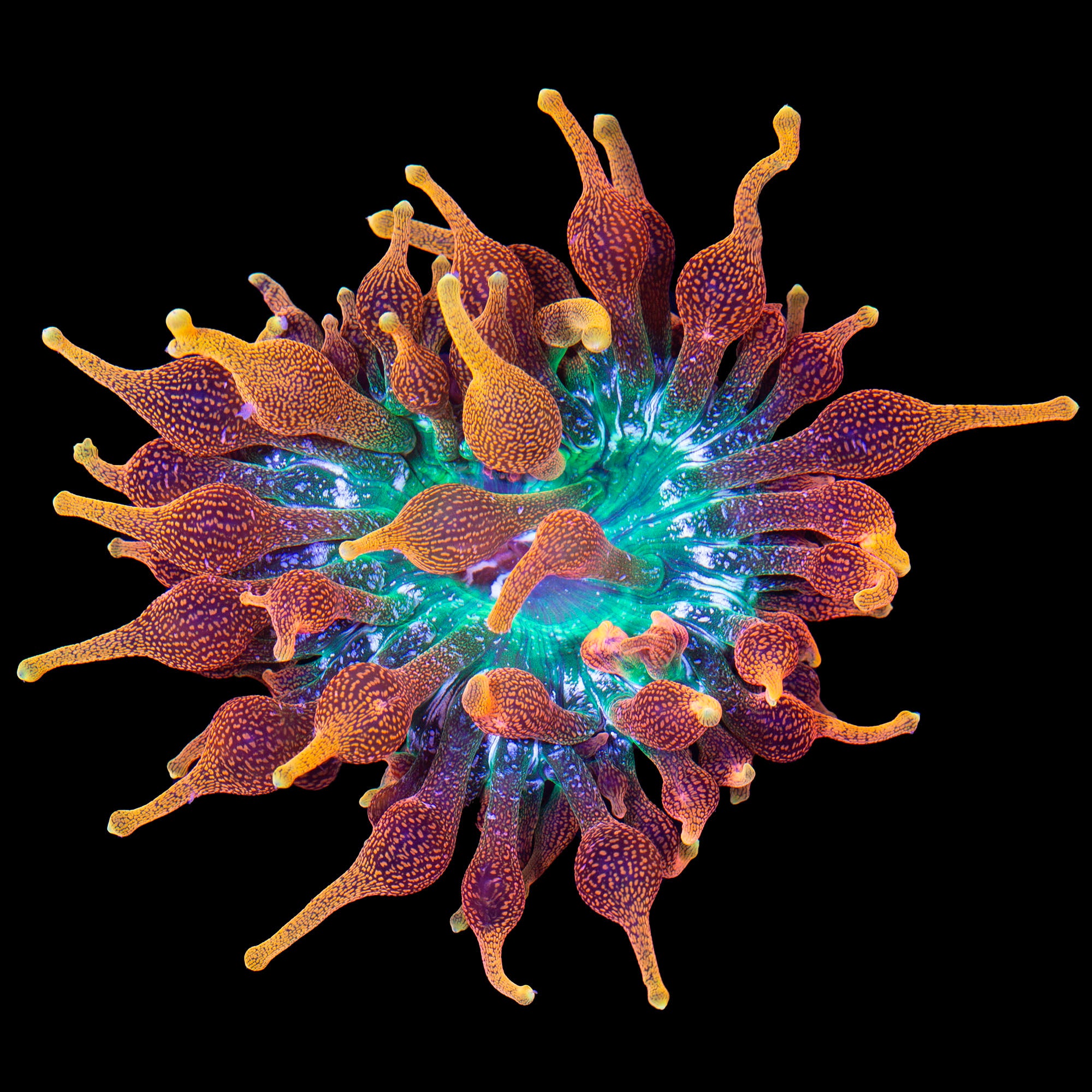Black Friday SALE 50% OFF ALL Frags & 25% OFF ALL Colonies
Vivid's Colorado Sunburst Bubble Tip Anemone | Anemone Bubble For Sale
$ 499.99
Please select all options.
How to Care for Sunburst Anemone
written by Dave Burr
The Colorado Sunburst Anemone, is a rare color morph of the Bubble Tip Anemone. If you have never kept an anemone in your reef tank before, the Sunburst Anemone is your best choice. These beautiful anemones are much easier to keep than any other anemone we sell. Although all anemones can move around the aquarium, Rose Anemones seem to stay put much better than other anemones. They prefer to anchor their column, or foot, on the rock rather than the sand.
The Colorado Sunburst Anemone must be kept without any other Bubble Tip Anemones in the same system otherwise they are often killed via chemical warfare.
Behavior:
The Sunburst Anemone will host a wide variety of clownfish including Ocellaris, Percula, Maroon, and Gold Maroon Clownfish. Keeping the anemone with a clownfish will help it acclimate faster since the clownfish will feed it scraps of food.
Tip:
Do not try to move the anemone once anchored because its column, or foot, can be easily torn. Most anemones will die from a torn column. Be prepared to move corals out of its way if it should choose to anchor too close to them.
Gloves:
We recommend wearing gloves when handling Anemones. When placing the anemone, try to support it from its slippery underside. Do not use tongs, and do not touch this anemone with bare hands.
Placement:
Turn down the flow and place the Sunburst Anemone in a crevice in the rock. After it has attached you may increase the flow again. Try to minimize handling and support it by its slippery foot as much as possible. Leave 3"-5" between the anemone and nearby corals. Remember that it may or may not choose to stay where you place it. If it moves to a different spot be prepared to move corals out of its way. It will not sting and kill corals instantly but they should be moved away within 12-24 hours. If a Bubble Tip Anemone anchors where you don't want it to try adjusting the direction of flow in the aquarium to cause it to release and re-attach elsewhere.
Feeding:
Feed large pieces of silverside, squid, shrimp, and other meaty foods several times a week. Use a feeder stick and touch the piece of food against the anemone. Its sticky tentacles will grab onto the food. Be careful not to poke the anemone.
Lighting & Flow Requirements:
The Bubble Tip Anemone requires moderate water flow and medium lighting to high lighting (PAR 220-350). T5's, Metal Halides, or LED's can all maintain Bubble Tip Anemones when the proper PAR levels are provided. We recommend a 14-20K color spectrum for best coloration.
Anemone Bubble Facts:
Bubble Tip Anemone Care Level: Easy
Lighting Requirements: Moderate to high (PAR 220-350)
Water Flow: Moderate
Aggressiveness: Aggressive
Range: Fiji, Tonga, Indo-Pacific
Family: Actiniidae
Water Conditions: 75-80° F; sg 1.024-1.026 (1.025 is ideal); pH 8.1-8.4 Ca 420-440 ppm, Alk 8-9.5 dKH, Mg 1260-1350, Nitrates <10ppm, Phosphates, < .10ppm
Water Chemistry:
It is important that proper calcium (420-440 ppm), alkalinity (8-9.5 dkh - run it 7-8 if you are carbon dosing) , and magnesium levels (1260-1350 ppm) are maintained. Raising magnesium levels gradually up to 1400-1600 ppm can help to combat algae outbreaks, just keep CA and Alk in line as you raise the Mg. Nitrates should be below 10 ppm and phosphates should be below .10 ppm. We recommend doing a water change when Nitrate levels rise to 10 ppm. It is important to replace your phosphate media when phosphates rise to .10 ppm. Media Reactors make the most efficient use of your phosphate media by fluidizing it.
Dosing:
Vivid Aquariums uses and recommends dosing pumps to automate the dosing of additives and keep your levels more constant. A dosing pump can alleviate the chore of manually dosing your aquarium with Ca, Alk, & Mg 2,3, or 4 times per week and will benefit your aquarium by keeping your levels constant through frequent small additions of Ca, Alk, & Mg. Our tanks all progressed when we switched from 3 manual dosings per week to 70 automatic dosings per week and we got a lot more work done.
Category: 300-500, Anemones, entacmaea-quadricolor, moderate-to-high-lighting, symbiotic-relationships
Type: Invert



